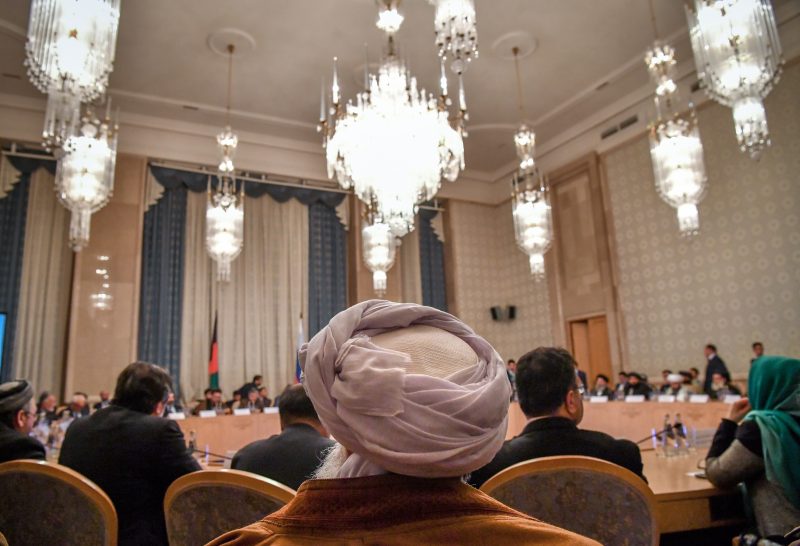Moscow firms up foothold in Afghanistan as US eyes exit
Moscow brought together the Taliban and powerful Afghan politicians for two days of unprecedented talks (Yuri KADOBNOV)
Moscow (AFP) – Decades after the Soviet Union’s disastrous venture into Afghanistan, Russia is emerging as a major player in the region with ties to the Taliban and Afghan politicians as US troops withdraw from the country.
This week Moscow brought together the Taliban and powerful Afghan politicians for two days of unprecedented talks Tuesday and Wednesday, the insurgents’ most significant engagement with Afghan leaders in recent memory.
In incredible scenes broadcast around the world, former president Hamid Karzai and other leaders shared prayers and meals with the Taliban while discussing the future of the conflict-riven country at a hotel that belongs to the Kremlin.
“This is a turning point,” Andrei Serenko, an expert at the Centre for Contemporary Afghan Studies, told AFP.
“From reacting to other players’ initiatives, Russia has switched to generating its own initiatives in the region.”
Washington’s decision to draw down troops from Afghanistan in a bid to extricate itself from the nearly 18-year war can become both a boon and bane for Russia, analysts say.
On the one hand, Moscow will burnish its credentials as a major player and mediator in the region; on the other hand, the US withdrawal will increase risks of instability and violence in Central Asia, seen as Moscow’s sphere of influence.
“Russia is returning to Afghanistan using it as a platform for confrontation with the United States,” independent expert Arkady Dubnov told AFP.
Dubnov added that Russia was vitally interested in seeing stability and security in the impoverished country’s northern provinces.
While he said Moscow would not send troops to the country given the Soviet Union’s painful experience in Afghanistan, Russia could provide other forms of assistance.
“If there’s a request from the leadership, money and arms supplies cannot be ruled out,” Dubnov added.
– ‘A more involved role’ –
The Soviet Union’s 1979-1989 invasion of Afghanistan has deeply scarred the nation.
The 10-year conflict, which saw Moscow intervene in support of the Afghan communist government, claimed the lives of more than 14,000 Soviet troops, and has come to be seen in Russia as a huge foreign policy blunder.
“A more involved role for Moscow has surprised many, mostly due to Russia’s bloody history in Afghanistan,” said The Soufan Center, a non-profit security analysis group.
Despite the presence of US troops and support for the government of Ashraf Ghani, Washington may find itself marginalised in the country as regional powers like Russia come to the centre stage, the group said.
While Moscow has sought to distance itself from the conference, calling it an initiative of the Afghan diasporas, few doubt the Kremlin’s deep involvement.
Representatives of the Kabul government were not present at the conference.
Instead, the Taliban, who ruled Afghanistan under a ruthless interpretation of Sharia law between 1996 and 2001, sat down for talks with Ghani’s rivals including Mohammad Haneef Atmar as the country prepares to hold presidential elections in July.
“Moscow does not believe in Ghani’s future,” said Serenko of the Centre for Contemporary Afghan Studies, suggesting Russia was backing Atmar in the run-up to the polls.
– ‘Romance with Taliban’ –
Serenko also said Moscow used this week’s conference to legitimise its long-held ties with the Taliban which Russia still designates as a terrorist group.
“For the past ten years Russia has been romantically involved with the Taliban. Now this romance has been made public,” Serenko said.
“Today the Taliban, who only respect force, and Russians speak the same language.”
The Moscow meeting came a week after the insurgents held separate peace talks with American negotiators in Doha, where Ghani was again not invited to the table.
Ghani’s allies in Washington insist Afghans should lead the peace process, and ostensibly the months-long push by the US to engage the Taliban has been aimed at convincing them to negotiate with Kabul.
The Russian government also held a meeting on Afghanistan in November.
Some frown upon Russia’s involvement.
“By getting the Afghan opposition to talk to the Taliban, Moscow risks fracturing an already fragile yet fledgling peace process-and provoking a fresh crisis within an Afghan government already riven by deep divisions,” Michael Kugelman, an analyst at the Wilson Center in Washington, told AFP.
But organisers of the Moscow conference said Russia’s perceived neutrality during Washington’s war in Afghanistan made the country well-suited for the mediation.
“During the past 18 years, Russia has proved that it supported neither side in the conflict,” said Ghulam Mohammad Jalal, one of the conference’s organisers.
“That is why it has earned in Afghan society the status of a neutral country with a neutral position.”
Disclaimer: This story is published from a syndicated feed. Siliconeer does not assume any liability for the above story. Validity of the above story is for 7 Days from original date of publishing. Content copyright AFP.


